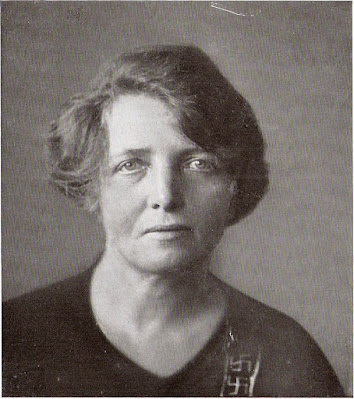Ethical Pluralism (a new Mathilde Ludendorff) and panentheism
Ethical Pluralism and Panentheism: Intersections of Immanence, Transcendence, and Plural RealitiesIntroduction: The Divine Within and Beyond in Philosophical DialogueIn the ongoing exploration of how divinity intersects with the fabric of reality, panentheism and Ethical Pluralism offer compelling frameworks that bridge immanence (the divine within the world) and transcendence (the divine beyond it). Panentheism, a term coined by Karl Christian Friedrich Krause in the 19th century but with roots in ancient thought (e.g., Plotinus' Neo-Platonism, certain Hindu Upanishads, and Christian mystics like Pseudo-Dionysius), posits that God encompasses and interpenetrates the universe while also transcending it—"all in God, but God is more than all." This view, articulated by thinkers like Alfred North Whitehead in process theology, sees reality as dynamic, with God as the inclusive ground of being that evolves with creation, fostering ethical implications of interconnectedness, creativity, and relational responsibility.Ethical Pluralism, a modern philosophical system, contrasts yet resonates by affirming reality as irreducible plural essences—independent modes like persistence (continuity), finitude (termination), transformation (change), consciousness (awareness), aspiration (value strivings), transcendence (beyond constraints), moral discernment (evaluation), and relational fulfillment (bonds)—coexisting without unity or hierarchy. Grounded in quantum indeterminacy and evolutionary contingency, it derives ethics from experiential affirmation via "God-Cognisance," emphasizing fulfillment amid diversity without dogma.This essay compares them, highlighting convergences in immanent-transcendent divinity and ethical relationality, while noting divergences in unity (inclusive whole vs. absolute separation), multiplicity (evolving process vs. ontological independence), and purpose (creative becoming vs. purpose-free affirmation). Through metaphysics, epistemology, ethics, and modern contexts, we see Pluralism as a scientifically pluralized evolution of panentheism's ancient insights, complementing its unity with irreducible diversity.Metaphysical Relations: Inclusive Unity Versus Absolute PluralityPanentheism's metaphysics blends pantheism's immanence with theism's transcendence: God contains the universe (all in God) but exceeds it, as in Whitehead's "dipolar" God—primordial (eternal potential) and consequent (evolving with creation). Multiplicity is real but encompassed—creation's diversity (e.g., beings, processes) participates in God, with impermanence as becoming, not illusion. God is relational, affected by the world, fostering a dynamic cosmos where unity integrates plurality.Ethical Pluralism echoes panentheism's immanence-transcendence: Visible essences (inside spacetime, like transformation) interpenetrate invisible ones (outside, like transcendence), mirroring God's inclusion. Quantum entanglement (links without fusion) parallels panentheistic participation—essences interact relationally without dissolution. Both affirm real multiplicity: Panentheism's diverse creation vs. Pluralism's independent essences; impermanence aligns—finitude-transformation as becoming.Convergences: Both transcend strict theism/pantheism—panentheism's "all in God" echoes essences' coexistence; relationality unites (God's affectedness vs. contingent interactions). Divergences: Panentheism unifies multiplicity in transcendent God; Pluralism rejects any encompassing whole, critiquing as imposition (e.g., creation's participation as false unity on independent essences). Panentheism's evolving God contrasts Pluralism's static plurality without teleology.This metaphysical relation reveals Pluralism as panentheism's pluralistic critique: Both interpenetrate immanence-transcendence, but Pluralism separates for diversity's integrity.Epistemological Relations: Mystical Participation Versus Experiential AwarenessPanentheism's epistemology blends reason and mysticism: Knowledge derives from rational contemplation (Spinoza's intellectual love) and experiential union (mystics' divine indwelling), transcending limits for insight into God's inclusive nature. Whitehead's process emphasizes empirical-rational synthesis, where knowledge evolves with reality.Ethical Pluralism echoes experiential emphasis: Reason limits to visible essences; invisible demand intuition/transcendence—God-Cognisance as direct apprehension of plurality. Like panentheistic mysticism, discernment cultivates participatory insight.Convergences: Both privilege experience—panentheism's union mirrors intuition's transcendent states; critique of pure reason (limited to modes vs. visible). Divergences: Panentheism's insight unifies in God; Pluralism affirms multiplicity, integrating science (quantum intuition) where panentheism's pre-modern blends rational-mystical.Pluralism complements panentheism epistemologically: Both seek participatory knowledge, but Pluralism grounds it empirically, pluralizing divine insight.Ethical Relations: Relational Creativity Versus Intrinsic AffirmationPanentheistic ethics derive from divine inclusion: Since all participates in God, harm distorts the whole—ethics emphasize creativity, love, and responsibility (Whitehead's "creative advance"). Morality is relational, deriving from God's lure toward beauty/harmony.Ethical Pluralism derives ethics from essence-affirmation: Intrinsic goodness affirms plurality without purpose—discernment evaluates for harmony. Like panentheism, affirmation fosters relationality; ethics as participatory.Convergences: Both intrinsic/pragmatic—panentheism's creativity parallels affirming aspiration; compassion echoes relational fulfillment. Divergences: Panentheism's ethics unify in divine process; Pluralism affirm independence—critiquing lure as imposing purpose. Panentheism's teleological good contrasts Pluralism's purpose-free.Pluralism critiques panentheistic ethics: Inclusion risks immoral reduction (e.g., all as God ignores finitude); affirming plurality enables discerning ethics without unity.Modern and Scientific Context: Pluralism's Complement to Panentheistic DynamismPanentheism adapts to science (e.g., process theology with evolution as divine creativity) but faces challenges—unity aligns with holism, but inclusion clashes with quantum discreteness. Ethical Pluralism complements by pluralizing panentheism: Quantum essences (multiple without substance) echo modes but affirm independence; evolution's contingency as creative without teleological God.Relationally, Pluralism updates panentheism—affirmation as discerning participation in inclusive multiplicity—while panentheism enriches with creative ethics. Yet, Pluralism critiques panentheism's unity: Affirming multiplicity integrates science's separations.Conclusion: A Pluralistic Panentheism for Ethical MultiplicityEthical Pluralism and panentheism relate as inclusive allies: Both interpenetrate immanence-transcendence for ethical living, but where panentheism unifies for creative harmony, Pluralism pluralizes for affirmation. This relation fosters synergy—Pluralism grounding panentheism scientifically, panentheism deepening Pluralism's dynamism. In a relational cosmos, their fusion might yield "plural panentheism": Affirming essences in transcendent God, guiding ethics toward harmonious fulfillment amid multiplicity.



Comments
Post a Comment